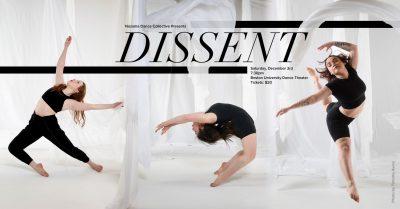What Dana Alsamsam, the now artistic director of Nozama Dance Collective, remembers about her first rehearsal at the company are the words of another dancer in the room, who had been with the company for years.
“She came up to me and just said, ‘I’m so excited to learn from you,” Alsamsam said. “I loved watching you dance. I feel like we’ll really be able to learn from you.’ And that’s very much like in the spirit and DNA of Nozama, just being this kind, welcoming environment and community.”

Nozama showcased that “spirit and DNA” at the group’s 2022 show “DISSENT” at the Boston University Dance Theater on Dec. 3. Nozama Dance Collective is a Boston-based contemporary dance company that features 10 “non-men” dancers.
In 2021, during her first year as artistic director, the company’s show was entitled “Autonomy,” and focused on women’s and members of the LGBTQ+ community’s fight for their rights. Alsamsam said “DISSENT” was the natural “next chapter” in the story of Nozama.
“In this country in 2022, we’re still having to fight and disagree and go against the grain just to have those basic rights,” Alsamsam said. “So dissent … felt pretty natural to me.”
Nozama Dance Collective is focused on “portraying intersectional experiences of identity through technical movement and dance,” according to its website.
“We’re not afraid of talking about the news, talking about things that affect women and queer people in particular, because those are the identities that most affect the people in our group,” Alsamsam said.
Juliana Willey-Thomas, the rehearsal director of Nozama, said she was excited to share “DISSENT” with audiences and believed it was Nozama’s best show yet.
“To show the passion and the motivation in the work that we’ve been working on is something that’s really important to me,” Willey-Thomas said. “We’ve all collectively, no pun intended, put so much work into creating these pieces for not only ourselves but for the audience.”
Many of the collective’s “thoughts and opinions” for “DISSENT” were centered around the overturning of Roe v. Wade in June, which Alsamsam said “solidified” the theme. The rehearsal room served as a space for dancers to “process what had happened,” she said.
“We definitely have all been pondering this idea of dissent and keeping each other updated on our wins when we’re doing this positive political act of disagreeing in our everyday lives, because it’s not easy to do,” Alsamsam said.
Despite the often heavy nature of the subject of the choreography, Willey-Thomas said she aims to lead rehearsals with “lightness and levity,” in order to “meet everybody where they’re at.”
“I am myself most when I’m in the studio or on stage. I feel most authentic, I feel most organic and true,” Willey-Thomas said.“I look at (going to rehearsal) as the start of my week on Sunday versus the end of my weekend because I’m starting the week off on a good note.”
Sofia Harris, a freshman in the College of Communication and one of Willey-Thomas’ dance students, described the performance as “gorgeous.”
“Even though there was not really anything educational, I definitely feel like I learned something about every dancer,” Harris said. “It was really moving, and it left you thinking how to better yourself and better the world and really what it means to be a woman.”
Such a review is exactly what Alsamsam had hoped for. She said she hoped audiences would be impressed by the visual dancing and be moved by the performance’s message.
“For folks who maybe have similar identities to those of us on stage, I hope they feel seen and heard,” Alsamsam said. “For those who do not have similar experiences or identities to those on stage, I hope that it pushes them to think a little bit differently about something. A slight bit of discomfort while viewing or experiencing art I think is a very positive thing.”



















































































































